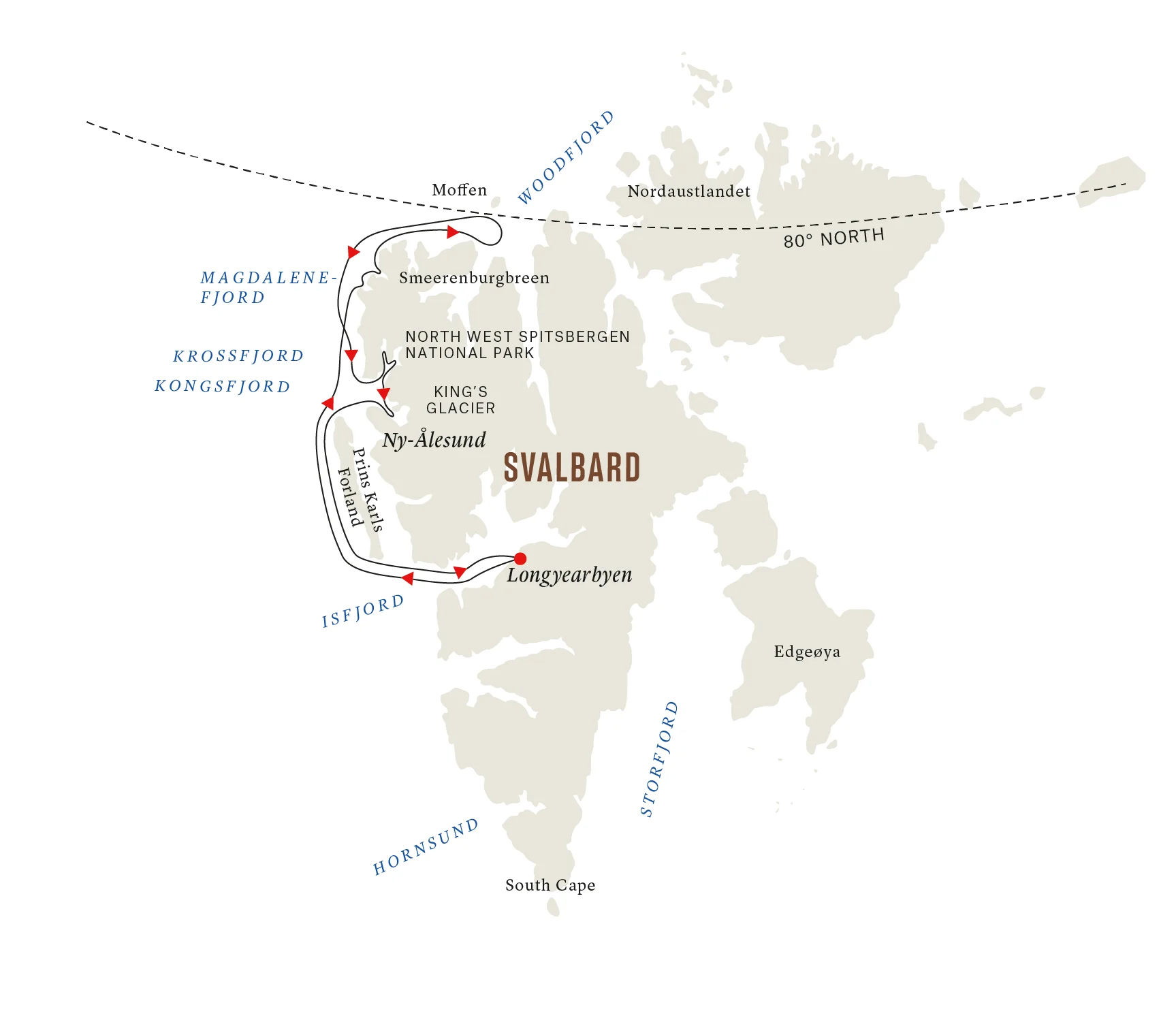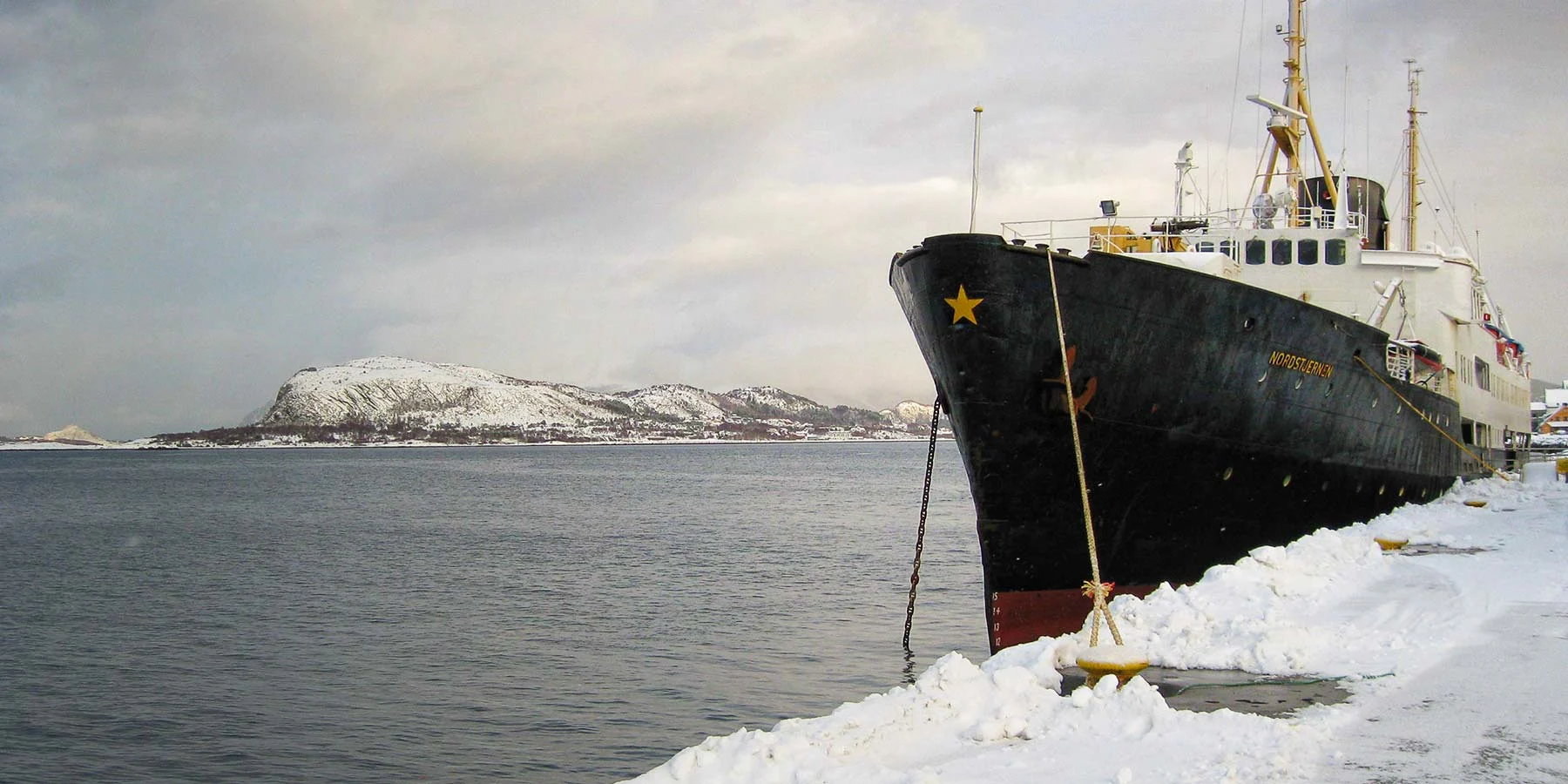
Day 1
On the edge of the Svalbard wilderness
On the edge of the Svalbard wilderness
LongyearbyenWelcome to the roof of the world! From Longyearbyen airport, a transfer brings you to the town itself, nestled on the banks of a large, sweeping fjord. Longyearbyen is the largest settlement in Svalbard, though the 2,000 inhabitants here are outnumbered by snowmobiles.
Originally a coal mining colony, today it is a hub for adventure travelers, as well as scientists and engineers attached to local research projects, like the famous Global Seed Vault.
Depending on when you arrive in Longyearbyen and check in to your hotel, you might have time to head to the aptly named North Pole Expedition Museum. There, you can immerse yourself in Svalbard’s polar exploration history with old newspapers, photos, postcards, several hours of original expedition film footage, and quirky historical artefacts. You could also visit the Svalbard Brewery and enjoy a tasting session of beers brewed in the Arctic.
In the evening, you’ll enjoy a light dinner at a local restaurant before spending the night at your hotel, which offers modern comforts in historical surroundings.

Day 2
Discovering Longyearbyen
Discovering Longyearbyen
LongyearbyenAfter breakfast, bring your bags to the bus and enjoy a guided tour that includes a visit to the Svalbard Museum, where you can find out all about the history, geology, and wildlife of the archipelago. Next, we’ll pay a visit to Camp Barentz, where you’ll learn about polar bears. While you’re there, keep an eye out for reindeer, grouse, and foxes.
The historic MS Nordstjernen awaits at the harbour. Built in 1956, it’s one of our most beloved and longest-serving vessels. Despite modernisation for exclusive Arctic sailing, MS Nordstjernen has retained its traditional Atlantic ship aura and offers a timeless experience not found on many other vessels.
After you settle in, you’ll discover the wonders of the Isfjord. As we sail in Svalbard’s second-longest fjord, look out for Arctic wildlife perfectly at home and witness nature’s raw power as showcased in majestic glacier fronts and rugged rock formations.

Day 3
To the top of the world
To the top of the world
Magdalenefjord and the North West CornerLeaving behind what little civilisation there is, we now enter full exploration mode. In these beautiful yet remote areas, there is no internet, nor are there telephone masts to provide a mobile phone signal. Free from emails and text messages, you can enjoy a rare opportunity to disconnect and detox from the modern world. It’s time to really get back in sync with what truly matters.
The North West Corner of Spitsbergen embodies Arctic beauty in all its rugged, untouched glory. This is a wilderness of steep mountains, stark glaciers, and eerily beautiful offshore islands. It’s also one of those rare spots in the world where natural beauty and fascinating history combine. A birdwatching mecca in the summer months, if we’re lucky may spot a polar bear searching for bird eggs nearby.
If there’s one place that represents the essence of what Svalbard has to offer, it’s Magdalenefjord. Framed by spectacular views of jagged mountain peaks and glaciers, this breathtaking fjord has an Alpine feel to it, despite its remote location in the far north-west.
Magdalenefjord’s beautiful beach is peppered with evidence of a whaling station from the 17th Century. You’ll be able to see remains of blubber ovens, a cemetery of 130 graves, and a memorial to the whalers.
If the conditions are favourable, we plan to sail above 80° North, bringing you within 600 nautical miles of the North Pole. This high up, the sun is visible for 24 hours. Bask under the glorious Midnight Sun as you scan for wildlife on deck.
Directly above 80° North is Moffen, a intriguing little island known for its walrus population. Large numbers of them usually gather at the southern tip of the island. Our approach to the island will adhere to the 300m exclusion zone to avoid disturbing this vulnerable animal.

Day 4
Fantastic fjords and mining history
Fantastic fjords and mining history
Ny-ÅlesundAlso known as Kong’s Fjord or King’s Bay, Kongsfjord is the largest fjord on the northwest coast of Spitsbergen. Two imposing glaciers, Kongsvegen and the colossal Kongsbreen, watch over the entrance of the fjord. As we cruise silently, you might hear the tell-tale creaks and groans of chunks of glacier ice about to plunge into the sea. Framed by picturesque mountain formations, it’s undoubtedly one of Svalbard’s most scenic spots.
Hiking in the lush tundra will allow you to observe birds in a pristine environment. For bird lovers, Kongsfjord is a treasure trove. Northern Fulmars, Black-legged Kittiwakes, Atlantic Puffins and guillemots are just some of the species found here in the summer months. A bird sanctuary consisting of about ten islands lies at the inner end of the fjord, supporting breeding populations of protected species such as Pink-footed Geese and Common Eider.
Later, we dock at the former mining settlement of Ny-Ålesund. At 78º 55’ N, this is one of the world’s northernmost year-round communities. Transformed into an international science center, you’ll find a fair number of research stations from various countries dedicated to the study of glaciology, wildlife, and climate change.
You’ll unearth some fascinating history as you explore the settlement, which today hosts roughly 30-35 residents. Ny-Ålesund and its surrounding area are home to a large concentration of protected buildings and cultural artefacts left by Svalbard’s former settlers.
This tiny settlement is synonymous with historical attempts to reach the North Pole. Discover rich explorer history in the museum and see the mooring mast of Roald Amundsen’s airship “Norge”, before sending a postcard from the northernmost post box in the world!

Day 5
Cruising into the Isfjord
Cruising into the Isfjord
Isfjord, LongyearbyenThis morning we sail into the Isfjord, which means “ice fjord” in Norwegian. This is the most prominent fjord system in the Svalbard archipelago. Branching out to many smaller fjords, it forms a lush and beautiful system rich in wildlife and vegetation. Prepare to see immense U-shaped valleys carved out of the mountains by giant glaciers some 10,000 years ago.
To the north of the fjord, Alkhornet is a prominent landmark, an imposing example of carbonate rock, with a horn-shaped mount at its peak. Naturally, the surrounding wildlife has conquered it. This region is home to Arctic fox, Svalbard reindeer, and colonies of guillemots and kittiwakes.
Your voyage comes to an end back where it started in Longyearbyen. Why not take advantage of another opportunity to get to know this frontier town even further?
Get a taste of what it feels to live this far north. You’ll find that many places here hold the record for being the most north anything. The world’s northernmost cinema, church, library, high school, supermarket – they’re all here.
Browse the local shops for some souvenirs to take home, like a toasty Svalbard sweater or a box of local handmade chocolates. Svalbard is a duty-free zone and Longyearbyen has a selection of sports and outdoor clothing shops, so you can stock up on supplies for your next adventure!
Art lovers will definitely want to make time to visit Galleri Svalbard to admire diverse works of art inspired by the High Arctic.
In the evening, you’ll enjoy a farewell dinner at the hotel and say goodbye to your new-found friends.

Day 6
Say goodbye to Svalbard
Say goodbye to Svalbard
LongyearbyenIt’s time to bid farewell to Svalbard as your Arctic adventure comes to a close. As you wind down from your voyage, you’ll have some time to look back on all your new memories, still holding onto that elated feeling of having just been quite literally near the “top of the world”.
A transfer will whisk you from your hotel to the airport for your flight home. Whatever’s next for you, we wish you a safe onward journey and look forward to seeing you again!


